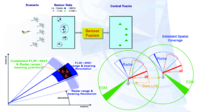
Photo from wikipedia
Abstract Aims: The ability of a single-sensor gas diagnosis device (SSGDD) as a virtual sensor array data to appraise thyme essential oils (TEO) based on its quantitatively release rate from… Click to show full abstract
Abstract Aims: The ability of a single-sensor gas diagnosis device (SSGDD) as a virtual sensor array data to appraise thyme essential oils (TEO) based on its quantitatively release rate from nanofibres was aimed. Methods: To form nylon 6 fragrant electrospun nanofibre, TEO was added as a natural antibacterial substance under homogeniser to make a stable emulsion. Results: The optimised nanofibre inactivated against Escherichia Coli and Staphylococcus Aureus bacteria up to >75% at once and to > 41.9% over 2-weeks period. Moreover, large differences in sensor responses to samples with experimental variables (percent TEO and storage time) and different odour intensity exist which correctly classified by discriminant function analysis. Conclusions: Odour intensity as an accessible incubator evinces the nanofibres efficiency which correlated to the antibacterial activity. With applying SSGDD technique as a quantified subjective solution, carefully odour assessment is possible and prepared mats could be demonstrated as a face-masks’ promising candidate.
Journal Title: Journal of Microencapsulation
Year Published: 2020
Link to full text (if available)
Share on Social Media: Sign Up to like & get
recommendations!